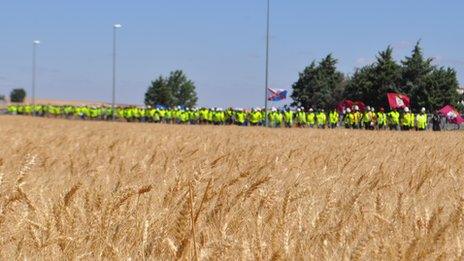Spain's miners march on Madrid over subsidy cuts
- Published

Spain's divisive battle over unemployment, austerity, and the role of the state has been encapsulated by its miners.
Some have been involved in violent clashes with police; others have chosen to register their discontent by way of a long march. The BBC's correspondent in Spain, Tom Burridge, joined them.
They walked 33km (20 miles) in less than seven hours, much of it in the searing heat of central Spain.
However, this was just one leg of a 20-day journey, which around 240 Spanish miners are due to complete on Wednesday.
When they arrive in Madrid they will have walked as much as 450km from their mining towns in northern Spain.
They will demand that the Spanish government reverses its decision to cut subsidies to the mining sector by nearly two-thirds next year.
Jose Gomez, 37, works at a coal mine in the village of Fabero, in the province of Leon.
"People hear and see us on the roads," he says.
"It's a way of keeping in people's minds, so we can take back what is ours."
'Marathon march'
The miners we joined walked in a long line along Spain's main A6 motorway.
A van up ahead coned off one lane of the road to protect the procession of fluorescent-jacketed protesters from the passing traffic.
Like marathon runners, the miners had food and water stations at several points along the way.
As we stopped for lunch there was an ambulance from the Spanish Red Cross on hand to attend to any injuries or sore feet.
At night the miners sleep in public sports centres.
Their belongings and inflatable mattresses were moved from one location to the next by a support team.
Under an agreement signed by members of the European Union, Spain is set to stop subsidies to non-profitable mines by 2018.
However, the Spanish government is speeding up those cuts, reducing the subsidies it pays to the mining sector by 63% next year.
The miners say the current Spanish government should stick to an agreement signed by the previous Socialist government in Spain, to reduce the subsidies, by only 10% in 2013.
"The government promised us money, and they haven't given it to us so we're going to fight for it," says Miguel Gonzalez Rodriguez, a miner who has been walking from his mine in the province of Leon, where he has worked for the past 10 years.
"We're prepared to go all the way with this."
'Pension privileges'
While the miners prepared to march the final leg of their journey, Spain's Prime Minister Mariano Rajoy was preparing to address the Spanish parliament.
He is likely to announce yet more austerity measures, including raising VAT on certain products and increasing the number of hours worked per day by civil servants.
Some in Spain believe the government is right to keep cutting its spending and raising taxes, to reassure the markets and please Brussels and the wider eurozone, which says it will, by the end of the month, hand over 30bn euros to Spain, which will in turn be injected into troubled Spanish banks.
However, the miners have become a symbol of discontent, not only towards their own bosses, but to the government's policy of tough austerity, which inevitably means a shrinking Spanish state.
When I suggest to the miners that the government has run out of money and is simply unable to pay huge subsidies to their sector, miner Miguel Gonzalez Rodriguez has this response: "When it comes to the banks the government has plenty of money. So why do they not have money for a sector like ours?"
The dispute has led to violent scenes in Spanish mining towns in recent weeks as miners have blocked roads and railway lines.
At times they have been seen running through the hills with balaclavas on, shooting firecrackers at the police in the valleys below.
The police have, on occasions, responded with rubber bullets.
Rafael Hernando, a Spanish member of parliament and spokesman for Spain's ruling Popular Party, says there is "understandably some concern" about what will happen when the miners arrive in Madrid.
The unions predict that around 25,000 people will join the miners to demonstrate outside the ministry of industry on Wednesday.
The Spanish government says it has paid billions of euros in subsidies to the mining sector in recent years.
With unemployment in Spain at 24%, it argues that mining should receive less money through state subsidies.
Popular Party MP, Rafael Hernando argues that "no other sector of the Spanish economy enjoys pension privileges" like those that exist for miners.
"When people really learn the privileges that the sector enjoys, the support that people have shown in Spain will disappear."
- Published19 June 2012
- Published14 June 2012
- Published13 June 2012